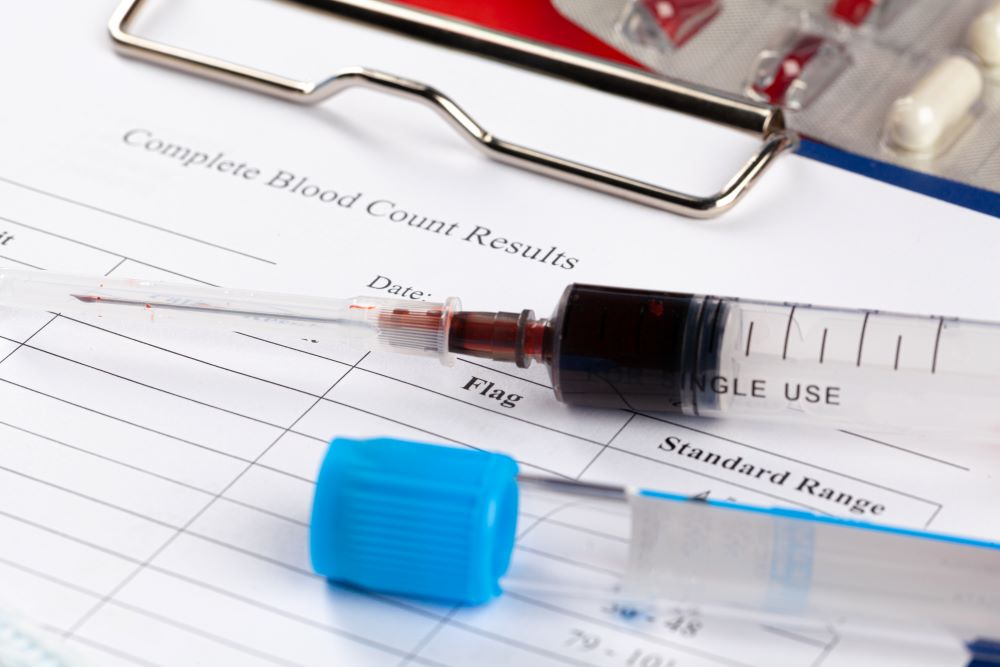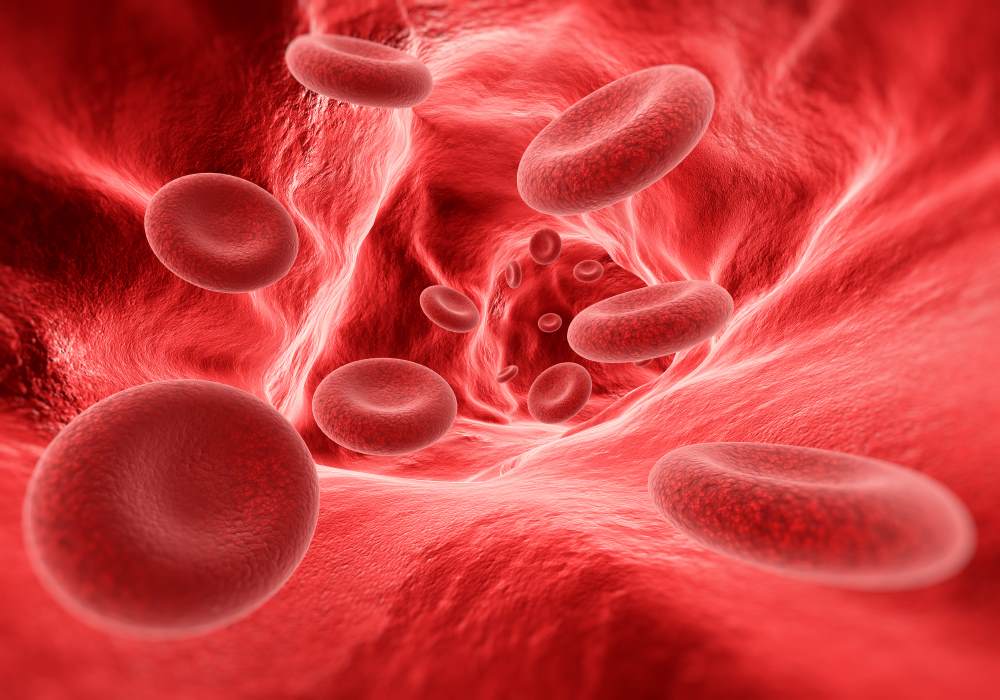What is RBC in Blood Test: Meaning, Range and Test Process

The red blood cells have haemoglobin which is primarily responsible for carrying oxygen to different body parts. The overall functioning of the tissues and different organs in a human body depends on the amount of oxygen they receive. Hence, it is very important to assess the RBC count of one’s body. This can be easily done with the help of an RBC count test.
In a blood test, an RBC count helps assess overall health and detect conditions such as anaemia or polycythemia. A normal RBC count varies depending on age, sex, and health status. Continue reading this piece to know more about the same.

Table of Contents

What Is RBC in a Blood Test?

An RBC count is a measurement of the number of red blood cells or erythrocytes in an individual's blood sample. These red blood cells are responsible for carrying oxygen from the lungs to the different organs in the human body. An inappropriate red blood cell count is one of the first signs of illness. Hence, this test allows an individual to get treatment even before the onset of symptoms.
Why is the RBC Count Test Necessary?
An RBC count test is usually a part of the complete blood count (CBC) test. This test is usually done with the motive of assessing the change in the normal range of RBC. Plus, an RBC count is needed in the diagnosis of various blood-related conditions, such as iron deficiency anaemia. Additionally, a lower RBC count also indicates kidney disease, malnutrition, internal bleeding and deficiency of vitamin B12 and vitamin B6.
When Should I Get the RBC Test?
An RBC test should be done when you need to assess your overall health or when any of the below conditions takes place:
- Routine Check-Up: An RBC test is often included in routine blood work to monitor overall health. It's typically done during annual check-ups to detect early signs of conditions like anaemia.
- Symptoms of Anaemia: If you're experiencing fatigue, weakness, or shortness of breath, an RBC test can help diagnose anaemia. These symptoms may indicate a low RBC count, which affects oxygen delivery in the body.
- Chronic Conditions Monitoring: For individuals with chronic conditions like kidney disease or heart disease, regular RBC tests are important. They help track how the condition affects red blood cell levels over time.
- Before Surgery: An RBC test is often required before surgery to ensure you have a healthy blood count. It helps assess the risk of complications related to blood loss during the procedure.
- Pregnancy Monitoring: Pregnant women may need RBC tests to monitor their health and that of their babies. It ensures both have sufficient oxygen levels, as pregnancy can alter RBC count.
What is the Procedure for the RBC Test?

Red blood cell count is a basic blood test that can be easily performed in a doctor’s office. The steps involved in an RBC count are as follows:
Step 1: They will first clean the area using an antiseptic. A small quantity of blood is drawn from the patient's vein for the RBC test.
Step 2: Following this, they will wrap a rubber band around the upper arm to make the vein swell with blood.
Step 3: Then, they will insert a needle in the vein and draw out blood in a tube or vial, and blood is drawn into a tube or vial for testing.
Step 4: Finally, they will remove the needle and the elastic band from the person’s arm.
Medical professionals will then send the collected blood sample to the laboratory for analysis.
How Should You Prepare for the RBC Test?
Usually, there are no special preparations needed before an RBC count test. However, the doctor might ask you to:
Do Not Do Intense Exercise Or Workouts: Refrain from intense physical activity before the test, as it can temporarily elevate your RBC count.
Reduce And Relax Stress: Stress and anxiety can affect blood test results. Try to stay calm and relaxed before the procedure.
Drink A Lot Of Water: Drink plenty of water before the test to ensure easy blood flow and an accurate result. Avoid excessive caffeine or alcohol, which can dehydrate you.
Delay Or Avoid Certain Drugs Or Medications: Inform your doctor about any medications or supplements you take, as some may affect your RBC count.
Relax Before the Test: Stress and anxiety can affect blood test results. Try to stay calm and relaxed before the procedure.
Follow Fasting Instructions (if required): Some blood tests may require fasting for a certain period before the test.
Note: Make sure to inform your doctors about the supplements and medicines you are taking.
Following these steps ensures your RBC test results are as accurate as possible. Proper preparation helps your doctor assess your health and detect any issues early. If you have any concerns, discussing them with your healthcare provider beforehand is always a good idea.
How is RBC Measured in Blood Tests?
RBC (red blood cell) count in blood tests is measured by analysing a blood sample in a laboratory. The laboratory uses automated equipment to count the number of red blood cells in a specific blood volume. This count is typically reported as the number of cells per microliter.
The measurement helps assess the efficiency of oxygen transport in the body and aids in diagnosing various health conditions related to blood and overall health.
How to Read Results of RBC in a Blood Test?
Reading RBC results in a blood test helps you understand your red blood cell count and its implications for your health. The results are typically presented numerically compared to the normal range.
Comparing your RBC count with these reference ranges helps determine if your levels are normal or if further evaluation is needed. Abnormal values may indicate conditions like anaemia or polycythemia. Always consult your doctor for a detailed interpretation of your results.
Normal Range of RBC in a Blood Test
The normal red blood cell count for men is 4.7 - 6.1 million RBCs per microliter of blood. Further, for women, the normal RBC count is 4.0 - 5.5 million RBCs per microliter of blood. The table below shows the normal range of RBC count for different age groups and gender:
Symptoms of High RBC
A high RBC count, known as polycythemia, can lead to various symptoms that may affect your overall health. These symptoms arise from the increased thickness of the blood, which can impact circulation.
These symptoms indicate that a high RBC count might affect your body's ability to function normally. If you experience any of these, consulting with a healthcare provider is important.
What If RBC in the Blood is High?
In case an individual has a high RBC count, it means they have erythrocytosis. This leads to the blood getting thicker than usual and increases the odds of blood clots. A higher RBC count is caused due to the following reasons:
- Heart failure leading to low oxygen levels in the blood
- Congenital heart disease
- Polycythaemia vera
- Kidney tumours
- Lung diseases like pulmonary fibrosis and emphysema
- Dehydration
- Residing at a high altitude
- Exposure to carbon monoxide
- Using performance-enhancing drugs, such as erythropoietin or testosterone
What are the Causes of High RBC?

High RBC counts, known as erythrocytosis or polycythemia, can be caused by various factors. Identifying the underlying cause is essential for appropriate treatment and management.
How to Increase RBC Count?
Low RBC count can result in certain chronic illnesses. Here are a few ways in which you can increase your RBC count:
- Consuming Iron Supplements Or Receiving Iron Infusions: Iron supplements can help boost RBC production by increasing the amount of iron available for haemoglobin synthesis.
- Consuming Vitamin Supplements B12 and folate are essential for RBC production and overall blood health. Supplements can correct deficiencies that might lead to low RBC counts and promote healthier blood formation.
- Blood Transfusion: A blood transfusion involves receiving donated blood to increase RBC levels quickly. This method is typically used in acute situations or when other treatments are ineffective.
Symptoms of Low RBC
Low RBC count, or anaemia, can lead to symptoms due to reduced oxygen delivery to the body’s tissues. Recognising these symptoms can help in seeking timely medical attention.
What If RBC in the Blood is Low?
In case an individual has a low RBC count, it means they have anaemia. This is generally caused by a decrease in the production of RBCs or a loss of RBCs. However, some of the most common causes of low RBC count are as follows:
- Certain medicines, such as chemotherapy drugs, antiretroviral drugs to treat HIV infection, etc.
- Blood loss
- Anaemia
- Leukaemia
- Chronic kidney diseases
- Cirrhosis
- Vitamin B-12 deficiency
- Stomach ulcers
- Lupus
- Inflammatory bowel disease
- Hypothyroidism
- Hodgkin lymphoma
- Lead poisoning
- Multiple myeloma
- Rheumatoid arthritis
What are the Causes of Low RBC?
Low RBC count, or anaemia, can result from various underlying conditions or factors. Identifying the cause is essential for effective treatment and management.
How to Decrease RBC Count?
A high red blood cell (RBC) count can lead to various health issues, such as an increased risk of blood clots. Managing and reducing elevated RBC levels is essential for maintaining overall health. Here are several methods to decrease RBC count:
- Phlebotomy: Regularly removing a certain amount of blood can help reduce the number of red blood cells in circulation. This is often used in conditions like polycythemia vera.
- Medications: Certain medications can help lower RBC production. Hydroxyurea or interferon can be prescribed to manage high RBC levels.
- Hydration: Increasing fluid intake can help lower RBC concentration by expanding blood volume and reducing blood viscosity.
- Addressing Underlying Conditions: Treating conditions that cause elevated RBC counts, such as chronic lung or heart diseases, can help normalise levels.
- Lifestyle Changes: Reducing stress and avoiding smoking can help manage RBC levels, as these factors can contribute to higher counts.
Other Factors that Influence RBC Levels
There exists more than one factor that, other than iron and vitamin supplementation, can affect the numbers of red blood cells (RBCs), such as:
- Exposure to Altitudes: Living or spending time at high altitudes can stimulate RBC production. More RBCs are produced in the body due to lesser oxygen in the air to make up for this difference.
- Exercise: Recurring physical activities, especially endurance training, may increase the number of red blood cells. This is because exercise can encourage more RBC formations due to an organism's raised need for oxygen.
- Water Balance: The dehydration process may cause increased erythrocyte parameters due to plasma volume reduction. Balanced blood fluid levels are kept by proper hydration so that accurate RBC counts are maintained.
- Smoking: Cigarette smoking lowers oxygen availability in the gas transport system, leading to elevations in RBC production. Chronic smokers tend to have higher RBC counts.
- Hormonal Imbalances: Some hormones, like erythropoietin (EPO), affect the production of red blood cells (RBCs). Modifications occasioned by diseases or treatments on hormone levels may lead to either increases or decreases in RBC counts.
- Chronic Diseases: Kidney disease or anaemia of chronic inflammation, for example, are chronic conditions that can lead to low concentrations of red blood cells. These diseases impair the body’s ability to produce sufficient Red Blood Cells (RBCs).
To summarise, high and low RBC counts can lead to several health conditions. Understanding the various factors influencing RBC levels is crucial for effectively managing health. By addressing these factors, individuals can better maintain balanced RBC levels and overall well-being. Hence, it is always a wise decision to go for an RBC count test if you have any symptoms of anaemia or erythrocytosis.
Protect What Matters - Explore Other Insurance Options














